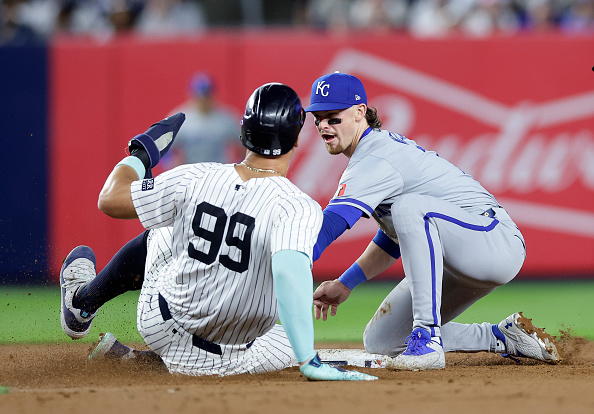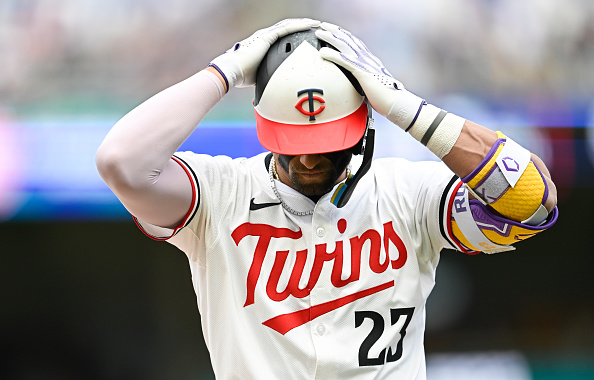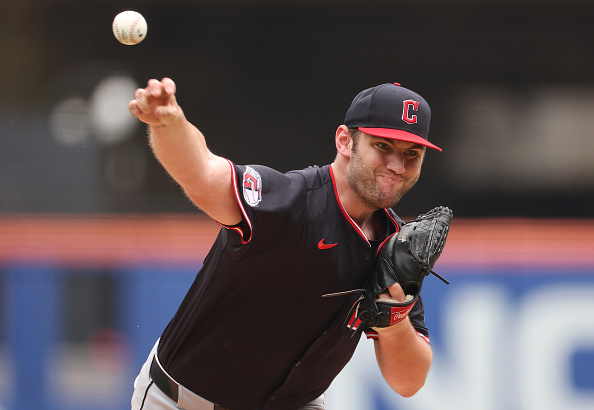The MLB season ended a few weeks ago with the Los Angeles Dodgers winning the World Series. This has sparked a debate about the best players from the 2024 campaign. Even though playoff performance is not factored into these awards, it still leads to greater debates. Without further ado, here are Chris Driscoll’s picks for each position.
Players must have at least 500 plate appearances to achieve eligibility.
Catcher
First Team: William Contreras
Second Team: Cal Raleigh
At the beginning of the MLB season, I projected Contreras to be the fourth-best catcher and Raleigh to be the sixth. Both surpassed expectations. While Contreras was debatably the best catcher in the National League last year, he was probably the best in all of baseball this year. Raleigh, meanwhile, was the best in the American League. Both finished with 5.4 WAR, 2.2 wins above the third-best qualified catcher (Salvador Perez). I gave Contreras the nod over Raleigh because he was a much bigger threat at the plate. Contreras had a 131 wRC+ to Raleigh’s 117.
First Base
First Team: Vladimir Guerrero Jr.
Second Team: Bryce Harper
This one was super tough. Heading into the season, I projected Harper second and Guerrero 10th. I was right about Harper, but certainly not about Guerrero. Guerrero had been on a steep decline since his dominant 2021 season when he had a 166 wRC+. In 2022, he dipped down to 132, then down to 118 in 2023. However, he got right back to superstar status this year when he jumped to 165. For Harper, many were concerned with his ability to field, but he finished fourth in defensive impact, according to FanGraphs. Freddie Freeman was considered, but he was not as effective at the plate and in the field as Harper.
Bryce Harper Grand Slam for the timeline pic.twitter.com/vCNTYegPd3
— Justin Lever ❤️⚾️ (@JustinLever3) November 6, 2024
Second Base
First Team: Ketel Marte
Second Team: Jose Altuve
Marte was above and beyond the best second baseman in MLB this year. He finished with 6.3 WAR, which was 2.1 wins more than the second-highest second baseman. This is as big as the gap between second and 10th. However, picking the second-best second baseman was a different story, and a lot more difficult. I was deciding between Altuve, Marcus Semien, and Nico Hoerner. Even though Altuve was the worst defensive second baseman of the three, he was above and beyond the other two at the plate. So, while some might argue that Semien’s full package outweighs Altuve’s batting abilities, I would rather have the elite bat.
Shortstop
First Team: Bobby Witt Jr.
Second Team: Francisco Lindor
This was the hardest position to choose. Before I dive into why I chose Witt over Lindor, I think you could argue that Gunnar Henderson (who I would put third) was the best shortstop in MLB this year. However, as elite Henderson was at the plate, he was not near the same level defensively as Witt or Lindor.
Now, as a Mets fan, it killed me to not put Lindor first. For a couple of months, it felt like he was the only one producing in the lineup and carrying the Mets to relevancy. If you ask any Met in the dugout, they will tell you Lindor’s impact goes well beyond the numbers. However, I simply cannot ignore Witt’s production.
Witt had a much higher wRC+ (168 versus 137), batting average, on-base percentage, and slugging percentage. He was also more impactful on the base paths. The only thing that Lindor has the edge in was home runs, and maybe fielding. In total, Witt had 2.6 more WAR than Lindor. Therefore, while I certainly will not fight you if you want to put Lindor, there is a reason why I chose Witt. He was debatably the best player in baseball this year not named Aaron Judge.
Third Base
First Team: Jose Ramirez
Second Team: Matt Chapman
There has been a lot of turnover in the debate surrounding MLB’s best third baseman. However, the one thing constant has been Jose Ramirez, who is always near the top of the list. This year, though, there was not much debate. Ramirez was easily the best batter and base runner amongst third basemen, which easily outweighs whatever fielding “deficiencies” he has.
Jose Ramirez was easily the best AL third baseman this season pic.twitter.com/7LBWI6KNZd
— Talkin’ Baseball (@TalkinBaseball_) November 7, 2024
Not only was picking Ramirez as the best super easy, but picking Chapman as the second best was almost as easy. As great as Rafael Devers was at the plate this year, his net negative in the field and on the basepaths, along with missing over 20 games, puts him a tick below Chapman.
Outfield
First Team: Aaron Judge, Juan Soto, Jarren Duran
Second Team: Jackson Merrill, Jurickson Profar, Riley Greene
Let’s get a couple of things out of the way. First, I ignored Yordan Alvarez because he only played 47 games in the field. For the same reason, I left off Mookie Betts, who spent just 43 games in the outfield. Betts is one of my favorite players, but he did not get picked for any of the positions. Not only did he get very minimal playing time in one set position, but he barely reached the 500-plate appearance threshold.
Anyone who paid attention to five minutes of baseball this year probably agrees that Judge and Soto were the two best outfielders this season. Further, even though picking Duran as the third-best outfielder was not as big a slam dunk as the first two, I think he was the pretty clear third-most-productive outfielder in MLB this year. Duran and Merrill were neck and neck at the plate, but Duran was slightly better in the field and much better on the base paths.
Most walks since Juan Soto’s MLB debut:
Juan Soto, 769 🤯
Bryce Harper, 538
Kyle Schwarber, 533
Carlos Santana, 526
Aaron Judge, 521
Max Muncy, 502
Freddie Freeman, 496 pic.twitter.com/0tVqqq2xVl— Codify (@CodifyBaseball) November 8, 2024
With Judge, Soto, and Duran rounding out the top five, this defaulted Merrill to the second team. Picking the last two guys was extremely tough. I believe there are six players for whom you can make a legitimate argument. While I think that Profar and Greene were the most deserving, if you put Steven Kwan, Corbin Carroll, or Colton Cowser on there, you will not get much rebuttal from me. This is especially the case for Kwan. If we are measuring on a per-game basis, you can make the argument that Kwan would have been even better than Duran. However, since I value games played, I gave the final second-team spot to Greene.
Designated Hitter
First Team: Shohei Ohtani
Second Team: Yordan Alvarez
Selecting a designated hitter is somewhat complicated since most teams do not have a set-in-stone DH. However, picking these two guys was not hard at all. Ohtani was so elite this year that he will be the first player to win MVP without playing a single inning in the field. For Alvarez, while he did play 47 games on the field, that should not punish him. Given that he played in 147 total games, was still one of the most impactful players in MLB, and played most of his games at DH, he deserves to be recognized. While you could make arguments for Brent Rooker and Marcell Ozuna, Ohtani and Alvarez were far more impactful.
Starting Pitchers
First Team: Chris Sale, Tarik Skubal, Zack Wheeler, Cole Ragans, Framber Valdez
Second Team: Seth Lugo, Dylan Cease, Christopher Sanchez, Logan Webb, Logan Gilbert
I could break down every one of these pitchers and explain why they deserve to be honored here, but that would get long and repetitive. With that said, it was much easier to pick the best pitchers this year than last year. Sale, Skubal, Wheeler, and Ragans were easily the four best pitchers in MLB. Even though Ragans’s ERA was not entirely great, his FIP (Fielding Independent Pitching) and WAR were in the top five.
I found it interesting how many outside factors existed when evaluating baseball’s top arms. While it is important to look at the full picture, at the end of the day, when a pitcher plays for an entire season, there comes a point where the argument of “talent” debunks accusations of “luck.”
Chris Sale’s slider was the best breaker in the majors last season and this plot shows why⬇️
The disparity between the release angles that generated swings and the release angles that led to in-zone sliders was tremendous. Truly an outlier pitch. pic.twitter.com/DBjj7euerR
— Maxwell Resnick (@MaxwellResnick) November 5, 2024
Relief Pitchers
First Team: Emmanuel Clase, Mason Miller
Second Team: Cade Smith, Griffin Jax
I evaluated relief pitchers the same way I did the starters. While I did the same thing last year, I emphasized saves. Even though I still believe it is important to show that you can close the door in close-game situations, similar to wins and losses, they are a very team-dependent stat. These four relievers produced the best results, regardless of whether they earned a save or not.
Main Image Credit:







